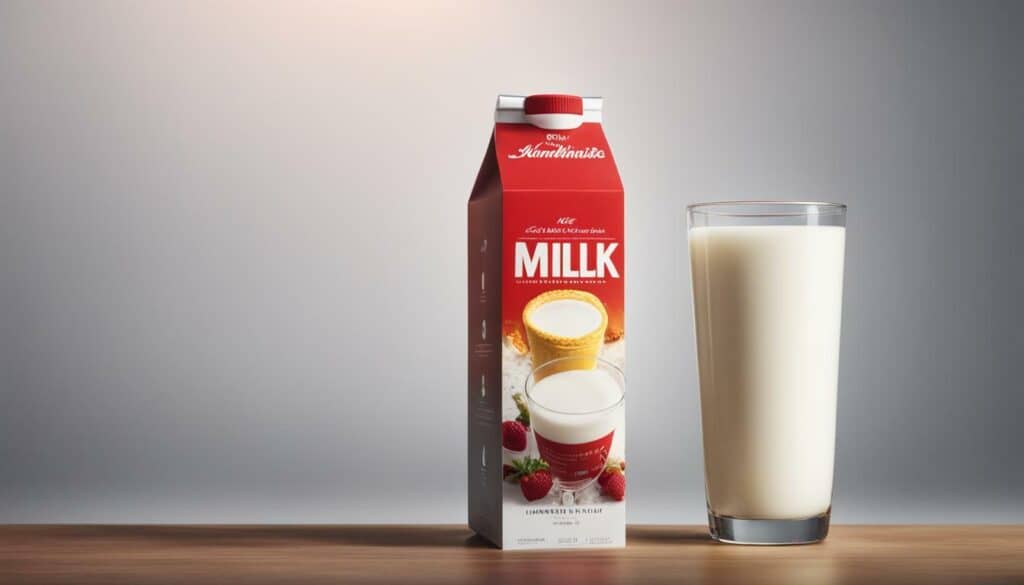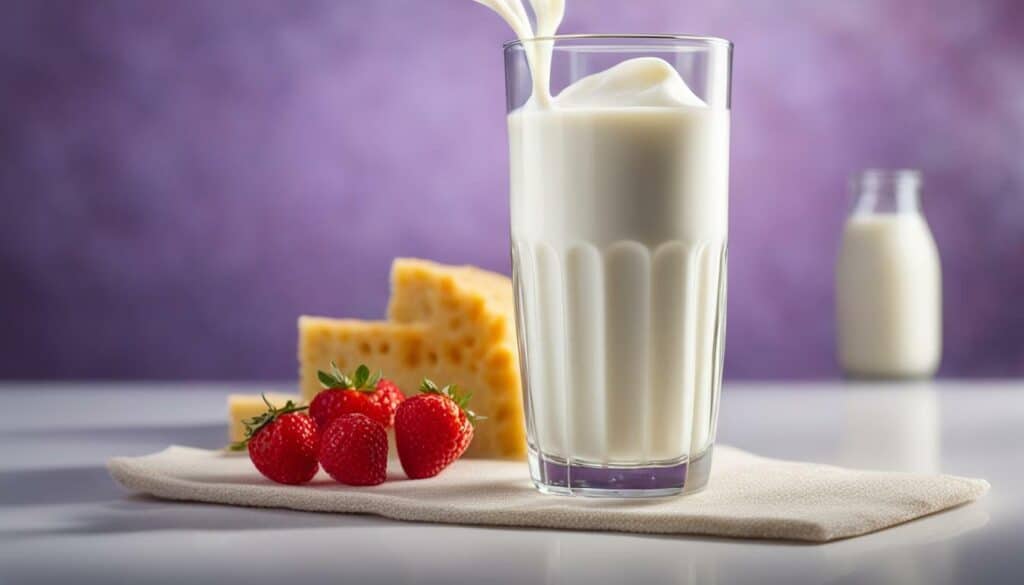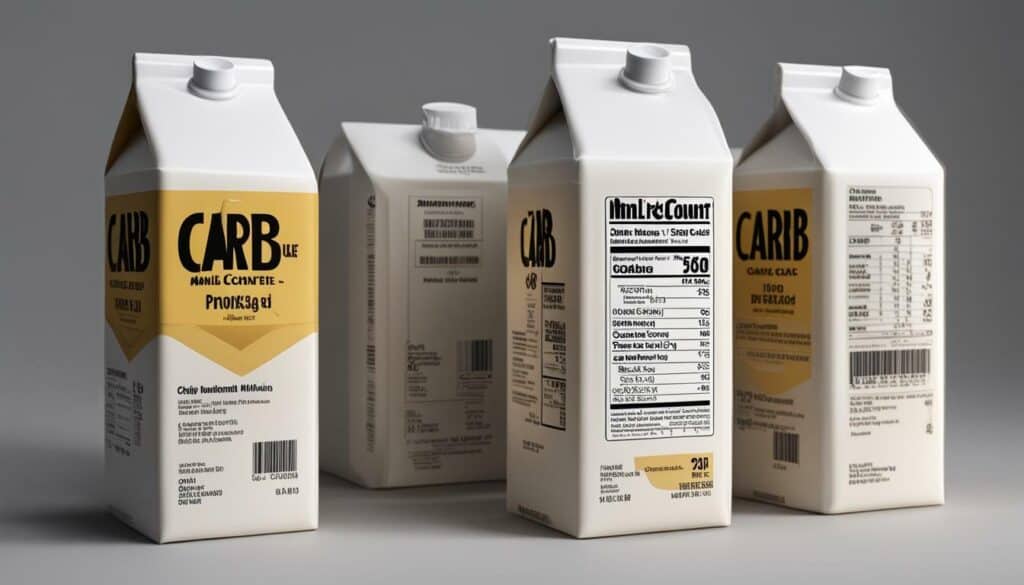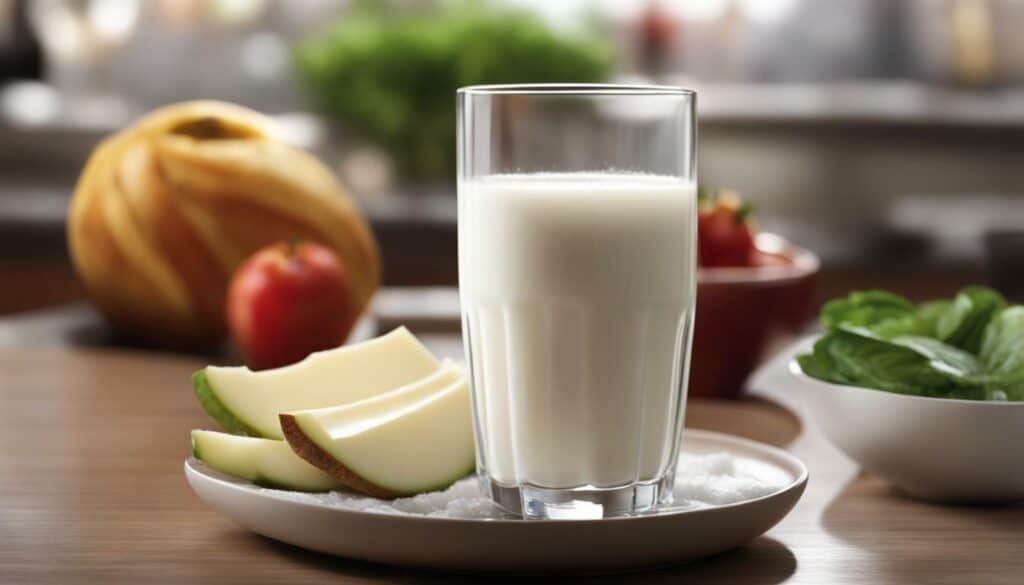Are you curious about the number of carbs present in a serving of milk? Let’s dive into the nutritional facts and discover the truth.
- One cup of low-fat milk contains approximately 12.2 grams of carbs.
- This milk variant has 1% milkfat, providing 102 calories, 8.2 grams of protein, and 2.4 grams of fat.
- It is also a rich source of essential vitamins and minerals, including calcium and vitamin D.
- Monitoring your carbohydrate intake is crucial for maintaining a balanced diet.
- Understanding the nutritional profile of milk can help you make informed dietary choices.
Now that we have uncovered the carbohydrate content in one cup of milk, let’s explore further to gain a comprehensive understanding of milk’s nutritional value.
Understanding Milk Nutrition Facts
Before delving into the specifics of milk’s carbohydrate content, let’s first understand its overall nutritional composition. Milk is a highly nutritious beverage that offers a range of essential vitamins, minerals, and macronutrients. It is a rich source of protein, calcium, and vitamin D, making it an excellent choice for supporting bone health and overall wellness.
When it comes to carbohydrates, milk contains a moderate amount. In a 1-cup serving of low-fat milk (1% milkfat), you can expect to find approximately 12.2 grams of carbs. Alongside the carbs, milk also provides 8.2 grams of protein, 2.4 grams of fat, and 102 calories.

Aside from its macronutrient content, milk is also a good source of various vitamins and minerals. It is particularly known for its high calcium content, which is essential for strong bones and teeth. Moreover, milk is fortified with vitamin D, which aids in calcium absorption and plays a vital role in maintaining overall bone health. Additionally, milk contains other essential nutrients like vitamin B12, phosphorus, and potassium, which contribute to various bodily functions.
In summary, milk is not only a tasty and refreshing beverage but also a valuable source of essential nutrients. Its moderate carbohydrate content, combined with its protein, fat, and micronutrient profile, makes it a well-rounded addition to a balanced diet. Whether enjoyed on its own, added to your morning cereal, or used in cooking and baking, milk can provide your body with the vital nutrients it needs.
Carbohydrate Content in 1 Cup of Milk
So, how many carbs can you find in a single cup of milk? Let’s find out the precise carbohydrate count. In 1 cup of milk, there are approximately 12.2 grams of carbs. This low-fat milk has a milkfat content of 1% and provides various essential nutrients.
Alongside its carbohydrate content, 1 cup of milk contains 102 calories, 8.2 grams of protein, and 2.4 grams of fat. It’s a delicious and nutritious beverage that can be enjoyed on its own, added to coffee or tea, or used in cooking and baking.
Here’s a breakdown of the macronutrients in a cup of milk:
| Macronutrient | Content per Cup |
|---|---|
| Carbohydrates | 12.2 grams |
| Protein | 8.2 grams |
| Fat | 2.4 grams |
Milk is not only a good source of carbs, but it also provides vital vitamins and minerals. It’s rich in calcium, which is essential for maintaining strong bones and teeth. Additionally, milk is fortified with vitamin D, which helps the body absorb calcium and promotes overall bone health.
So, if you’re looking for a nutritious beverage that offers a moderate carbohydrate content and a range of health benefits, a cup of milk is a great choice.

Aside from carbohydrates, milk contains other essential macronutrients. Let’s take a closer look at its overall macronutrient composition.
Milk is a rich source of protein, making it an excellent choice for those looking to meet their daily protein needs. In a 1-cup serving of low-fat milk, you can expect to find approximately 8.2 grams of protein. Protein is essential for building and repairing tissues in the body, and it also plays a crucial role in supporting immune function and maintaining healthy skin, hair, and nails.
Milk also provides a moderate amount of fat. In that same 1-cup serving, you’ll find about 2.4 grams of fat. While milk does contain some saturated fat, it is also a source of monounsaturated and polyunsaturated fats, including omega-3 fatty acids. These types of fats have been linked to various health benefits, such as reducing inflammation and supporting heart health.
When it comes to vitamins and minerals, milk offers a range of essential nutrients. It is particularly known for its high calcium content, which is important for building and maintaining strong bones and teeth. Vitamin D is another key nutrient found in milk, and it works alongside calcium to support bone health. Additionally, milk contains vitamin A, vitamin B12, and potassium, among other nutrients that contribute to overall health and well-being.
| Nutrient | Amount per 1 cup (low-fat milk) |
|---|---|
| Carbohydrates | 12.2 grams |
| Protein | 8.2 grams |
| Fat | 2.4 grams |
| Calories | 102 |
With its macronutrient profile and array of vitamins and minerals, milk can be a beneficial addition to a balanced diet. Whether enjoyed on its own, added to coffee or tea, or incorporated into recipes, milk provides a nutritious and versatile option for meeting your daily nutrient needs.

Carbohydrates play a crucial role in milk, providing energy and supporting various bodily functions. Let’s explore the importance of carbs in milk.
Milk is a nutrient-rich beverage that contains a variety of macronutrients, including carbohydrates. One cup of milk typically contains approximately 12.2 grams of carbohydrates. These carbohydrates are an essential source of energy for the body, especially for active individuals and athletes.
In addition to providing energy, carbohydrates in milk also play a key role in supporting brain function. The brain relies heavily on glucose, a type of carbohydrate, as its primary fuel source. Consuming milk, which contains carbohydrates in the form of lactose, can help ensure optimal brain function and cognitive performance.
| Nutrient | Amount per 1 cup of milk |
|---|---|
| Carbohydrates | 12.2 grams |
| Protein | 8.2 grams |
| Fat | 2.4 grams |
| Calories | 102 |
Milk also contains other important nutrients such as vitamins and minerals. It is an excellent source of calcium, which is essential for strong and healthy bones. Additionally, milk is fortified with vitamin D, which helps the body absorb and utilize calcium effectively.
Overall, carbohydrates in milk not only provide energy but also support brain function and contribute to the overall nutritional value of this dairy beverage. Including milk in your diet can help ensure you are getting essential nutrients, including carbohydrates, for optimal health and well-being.

Besides carbs, milk contains a variety of other essential nutrients that contribute to its overall nutritional value. Let’s discover what these nutrients are.
Milk is known for being a good source of calcium, which is crucial for strong bones and teeth. In fact, one cup of milk provides approximately 30% of the recommended daily intake of calcium. Additionally, milk is rich in vitamin D, a nutrient that helps the body absorb and utilize calcium effectively. Vitamin D is important for maintaining healthy bones and supporting overall immune function.
Furthermore, milk is a great source of protein, which is necessary for muscle growth and repair. One cup of milk contains around 8.2 grams of protein, which makes it a convenient and accessible option for individuals looking to increase their protein intake. Protein is also important for satiety, meaning that consuming milk can help you feel fuller for longer.
| Nutrient | Amount per cup (240ml) |
|---|---|
| Calories | 102 |
| Protein | 8.2g |
| Fat | 2.4g |
| Carbohydrates | 12.2g |
| Calcium | 30% |
| Vitamin D | – |
Finally, milk is a good source of vitamins such as vitamin B12, which is essential for maintaining healthy nerves and red blood cells. It also contains vitamin A, which supports eye health and immune function. These vitamins, along with minerals like potassium and phosphorus, contribute to the overall nutritional value of milk.
In conclusion, milk offers more than just carbohydrates. It provides a range of essential nutrients like calcium, protein, and vitamins that are vital for maintaining overall health and well-being. So, whether you enjoy a cold glass of milk or use it as an ingredient in your favorite recipes, you can be sure that you’re getting valuable nutrients with every sip.
Low-Fat Milk and Carbohydrates
If you opt for low-fat milk, what can you expect in terms of its carbohydrate count? Let’s examine the carb content of low-fat milk. Low-fat milk, typically containing 1% milkfat, provides a nutritious option with a lower fat content. But what about the carbs?
In a 1-cup serving of low-fat milk, you can expect to find approximately 12.2 grams of carbohydrates. This makes it a suitable choice for those who are conscious of their carb intake. In addition to the carbs, low-fat milk offers other essential nutrients such as 8.2 grams of protein, 2.4 grams of fat, 102 calories, as well as vitamins and minerals like calcium and vitamin D.
For those following a low-carb or ketogenic diet, it’s important to note that milk does contain carbs. However, with the moderate amount of carbs found in low-fat milk, it can still be enjoyed as part of a balanced diet. Remember, the key is to consume it in moderation and consider its carb content when planning your meals.
To give you a visual representation, here’s a table summarizing the nutritional content of 1 cup of low-fat milk:
| Nutrient | Amount per 1 Cup (244g) |
|---|---|
| Carbohydrates | 12.2g |
| Protein | 8.2g |
| Fat | 2.4g |
| Calories | 102 |
| Calcium | 30% of Daily Value |
| Vitamin D | 25% of Daily Value |
Next, let’s explore the carbohydrate content in different types of milk, such as whole milk and skim milk, and understand their impact on your daily carbohydrate intake.

How do different variations of milk compare when it comes to their carbohydrate content? Let’s analyze the carb breakdown of different milk types.
When it comes to milk, there are a variety of options available on the market, each with its own unique characteristics. One popular variation is low-fat milk, which contains 1% milkfat. In terms of carbohydrates, low-fat milk typically has a similar carb content compared to regular whole milk, with approximately 12.2 grams of carbs per cup. This makes it a suitable choice for those who are watching their carbohydrate intake but still want to enjoy the nutritional benefits of milk.
Additionally, there are also other variations of milk that cater to specific dietary needs. For example, lactose-free milk is a suitable option for individuals who have lactose intolerance. Lactose-free milk has the same nutritional profile as regular milk, including its carbohydrate content. This means that it contains approximately 12.2 grams of carbs per cup, making it a viable alternative for those who cannot digest lactose.
Furthermore, if you prefer non-dairy milk alternatives, such as almond milk or soy milk, it’s important to note that these options may have different carbohydrate contents compared to traditional cow’s milk. For instance, almond milk typically has a lower carb content, with an average of only 8 grams of carbs per cup. On the other hand, soy milk tends to have a slightly higher carb content, averaging around 12.7 grams of carbs per cup. These variations in carb content can be attributed to the differences in ingredients and processing methods used in the production of these milk alternatives.
| Milk Type | Carbohydrate Content (per cup) |
|---|---|
| Low-Fat Milk | 12.2 grams |
| Lactose-Free Milk | 12.2 grams |
| Almond Milk | 8 grams |
| Soy Milk | 12.7 grams |
As you can see, the carbohydrate content may vary depending on the type of milk you choose. It’s always a good idea to check the nutrition label to make an informed decision based on your dietary needs and preferences. Whether you opt for low-fat milk, lactose-free milk, or non-dairy alternatives, milk can still be a valuable source of essential nutrients, such as protein, calcium, and vitamin D, in addition to its carbohydrate content.

Overall, understanding the carbohydrate content of different milk variations allows you to make educated choices that align with your nutritional goals. Remember, moderation and balance are key when incorporating milk into your diet, ensuring you meet your dietary needs while enjoying the many benefits that milk has to offer.
The Importance of Monitoring Carb Intake
While milk can be a nutritious choice, it’s essential to be aware of your overall carbohydrate intake. Let’s understand why monitoring carbs is crucial.
Carbohydrates play a significant role in our diet as they provide the body with energy. However, consuming too many carbs can lead to weight gain and other health issues. By keeping track of your carbohydrate intake, you can maintain a balanced diet and make informed choices about the foods you consume.
When it comes to milk, it’s important to consider its carbohydrate content. In 1 cup of low-fat milk, there are approximately 12.2 grams of carbs. While this amount may seem moderate, it’s essential to factor it into your daily carb intake if you’re following a specific diet plan or monitoring your blood sugar levels.
Monitoring your carb intake becomes even more crucial if you have certain health conditions, such as diabetes. By understanding the carbs you consume from milk and other sources, you can manage your blood sugar levels more effectively and maintain optimal health.
| Nutrient | Amount per 1 cup of low-fat milk (1%) |
|---|---|
| Carbohydrates | 12.2 grams |
| Protein | 8.2 grams |
| Fat | 2.4 grams |
| Calories | 102 |
Remember, it’s not about completely avoiding carbs, but rather making informed choices about the quantity and quality of carbs you consume. By monitoring your carb intake, you can maintain a healthy and balanced diet while still enjoying the benefits of milk as part of your overall nutrition plan.

By exploring the carbohydrate content, nutritional facts, and variations of milk, we now have a comprehensive understanding of how many carbs are present in 1 cup of milk. When it comes to low-fat milk with 1% milkfat, there are approximately 12.2 grams of carbs, making it a moderate source of carbohydrates.
In addition to carbs, 1 cup of milk contains 102 calories, providing a decent energy boost. It also offers a good amount of protein at 8.2 grams, which is essential for muscle growth and repair. With 2.4 grams of fat, it remains a relatively low-fat option.
Milk is not just a source of carbs, protein, and fat. It also boasts various vitamins and minerals that contribute to overall health. Calcium, for instance, promotes strong bones and teeth, while vitamin D aids in calcium absorption. These nutrients make milk a valuable addition to a balanced diet.
Whether you prefer whole milk, 2% milk, or skim milk, the carbohydrate content will vary. However, by paying attention to the milkfat percentage, you can make an informed choice that fits your dietary needs. It’s important to note that while milk does contain carbs, they are not considered empty calories but rather part of a nutrient-rich package.
FAQ
Q: How many carbs are in 1 cup of milk?
A: There are approximately 12.2 grams of carbs in 1 cup of milk.
Q: What is the fat content of low-fat milk?
A: Low-fat milk, with 1% milkfat, contains 2.4 grams of fat per cup.
Q: How many calories are in 1 cup of milk?
A: 1 cup of milk contains 102 calories.
Q: What is the protein content of milk?
A: Milk provides 8.2 grams of protein per cup.
Q: Does milk contain any vitamins and minerals?
A: Yes, milk is a good source of various vitamins and minerals, including calcium and vitamin D.
What are the Surprising Facts About Calories in Eggs with Cheese?
Eggs with cheese make for a delicious and filling meal, but have you ever wondered about the calories in eggs with cheese? Surprisingly, a typical serving of scrambled eggs with cheese contains only around 250-300 calories. This makes it a nutritious and satisfying option for breakfast or any time of the day.





Leave a Reply